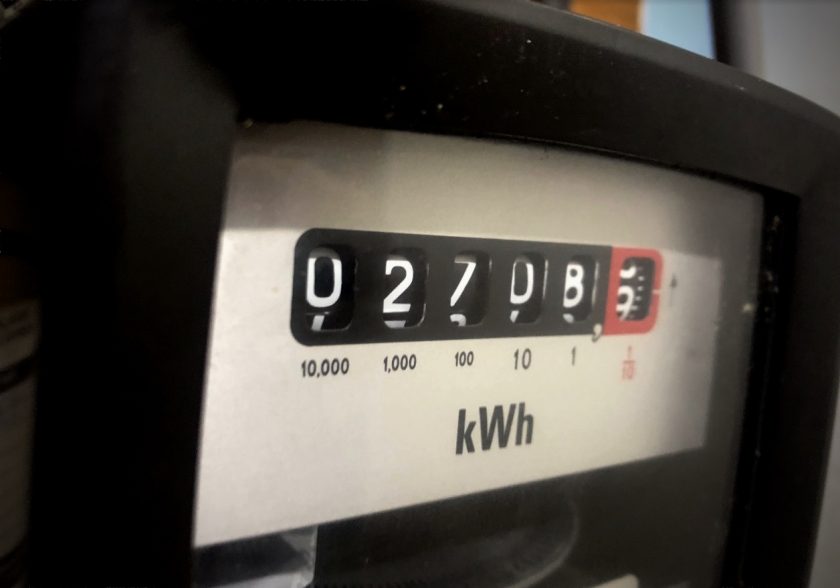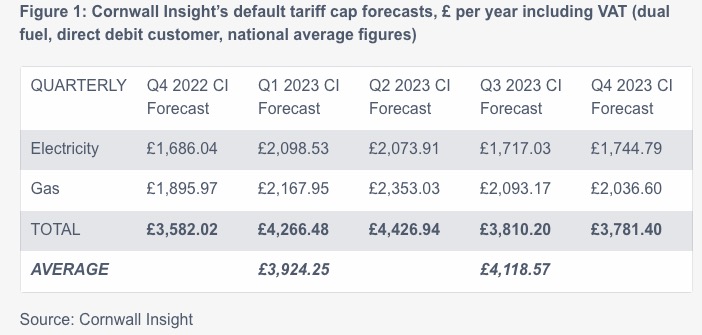Price cap forecasts for January could rise to over £4,200, according new analysis.

Energy bills could rise to £4,200 a year from January, according to new analysis.
The new January forecasts for the Default Tariff Cap (price cap) from Cornwall Insight have risen by over £650, meaning a typical household is now predicted to pay the equivalent of £4,266 a year for the three months to March 2023.
Ofgem confirmed last week the energy price cap will be updated quarterly, rather than every six months, and has warned that customers face a’ very challenging winter ahead. ‘
Forecasts for the October cap have also seen a rise, going up by over £200, with predictions for an average bill now sitting at £3,582.
Cornwall Insight has said the increase in forecasts since last month “reflects both the increase in the wholesale market in the intervening period and – crucially in the case of the Q1 2023 (Jan-Mar) and Q2 2023 (Apr – Jun) forecasts – a change in calculation methodology set for finalisation by Ofgem.”
In its initial proposals from May, Ofgem stated that an element of supplier costs “associated with wholesale market hedging” would be explicitly included within the cap methodology and would be recoverable over a 12-month period.
However, in a consultation document released last week, it was confirmed that these costs would be recoverable over a six-month period – “resulting in higher bills than previously forecast for the crucial January cap.” The energy consultant says.
“These new forecasts for the January to March 2023 quarter further underline the need for support for households who will struggle to pay their energy bills this winter.” Cornwall Insight said.

Dr Craig Lowrey, Principal Consultant at Cornwall Insight said:
“While our price cap forecasts have been steadily rising since the Summer 2022 cap was set in April, an increase of over £650 in the January predictions comes as a fresh shock.”
“The cost-of-living crisis was already top of the news agenda as more and more people face fuel poverty, this will only compound the concerns.”
Dr Lowrey said: “Many may consider the changes made by Ofgem to the hedging formula, which have contributed to the predicted increase in bills, to be unwise at a time when so many people are already struggling.”
“However, with many energy suppliers under financial pressure, and some currently making a loss, maintaining the current timeframe for suppliers to recover their hedging costs could risk a repeat of the sizable exodus seen in 2021.”
“Given that the costs of supplier failure are ultimately met by consumers through their energy bills, a change which means that this is less likely is welcome, even if the timing of it may well not be.”
He said: “Rather than critiquing the methodology of the cap, it may be time to consider the cap’s place altogether.”
“After all, if it is not controlling consumer prices, and is damaging suppliers’ business models, we must wonder if it is fit for purpose – especially in these times of unprecedented energy market conditions.”
“It is essential that the government use our predictions to spur on a review of the support package being offered to consumers.”
“If the £400 was not enough to make a dent in the impact of our previous forecast, it most certainly is not enough now.”
“The government must make introducing more support over the first two quarters of 2023 a number one priority.”
Dr Lowrey added: “In the longer-term, a social tariff or other support mechanism to target support at the most vulnerable in society are options that we at Cornwall Insight have proposed previously.”
“Right now, the current price cap is not working for consumers, suppliers, or the economy.”
Responding to the latest forecast, Morgan Wild, Head of Policy at Citizens Advice, said:
“The cost-of-living crisis is already having a devastating impact on people’s lives. Every day we hear from people who can’t afford to turn the lights on or cook their kids a hot meal.
“The government did the right thing by bringing in targeted support, but it won’t be enough for people to manage these previously unthinkable price hikes. The obvious place to start is to increase benefits to keep pace with the cost of living. There’s no time to waste.”
Spotted something? Got a story? Email: [email protected]
Latest News
